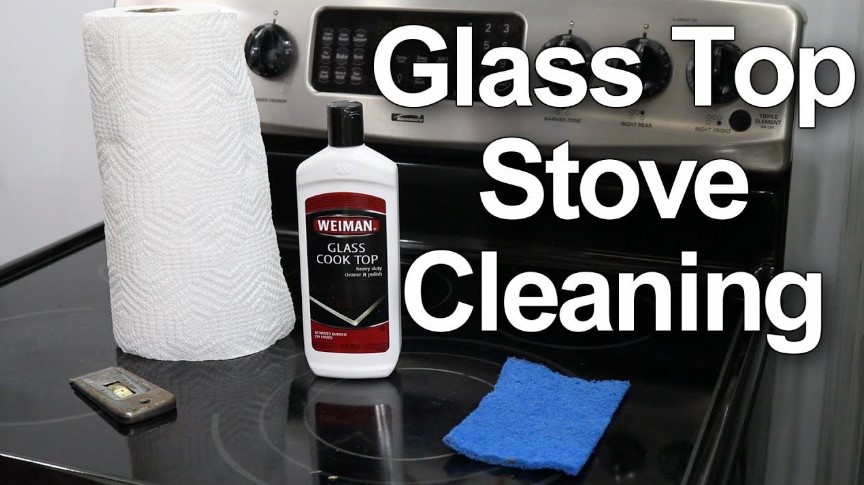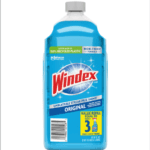When it comes to cleaning windows, many people reach for glass stovetop cleaner, assuming it’s a versatile solution for all glass surfaces. However, is this assumption correct? Let’s delve into the details to find out.
Understanding Glass Stovetop Cleaner
Glass stovetop cleaners are specifically formulated to remove tough stains and grease from stovetops. They typically contain harsh chemicals, such as ammonia or sodium hydroxide, which can effectively cut through grime. However, these chemicals can also be abrasive and damage delicate surfaces like windows.
Potential Risks of Using Glass Stovetop Cleaner on Windows
Using glass stovetop cleaner on windows can pose several risks:
- Damage to the Glass: The harsh chemicals in stovetop cleaners can etch or scratch the glass surface, especially if it’s not properly diluted.
- Streaking: The residue left behind by stovetop cleaners can create streaks and smudges on windows, making them appear cloudy or dirty.
- Fading of Window Frames: If the cleaner comes into contact with window frames made of wood or vinyl, it can cause discoloration or fading.
Alternatives to Glass Stovetop Cleaner for Windows
Fortunately, there are several safe and effective alternatives to glass stovetop cleaner for cleaning windows:
- Glass Cleaner: Specifically designed for windows, glass cleaners contain milder chemicals that won’t damage the glass.
- White Vinegar: A natural and inexpensive solution, white vinegar can effectively remove dirt and grime without leaving streaks.
- Isopropyl Alcohol: Diluted with water, isopropyl alcohol can be used to clean windows and remove stubborn stains.
Proper Cleaning Techniques
Regardless of the cleaning solution you choose, it’s important to follow proper cleaning techniques to avoid damaging your windows:
- Dilute the Cleaner: Always dilute glass cleaners or vinegar with water according to the manufacturer’s instructions.
- Use a Soft Cloth: Avoid using abrasive materials like paper towels or sponges, which can scratch the glass.
- Wipe in Circular Motions: Gently wipe the glass in circular motions to evenly distribute the cleaner and remove dirt.
- Rinse Thoroughly: After cleaning, rinse the windows thoroughly with clean water to remove any remaining residue.
Conclusion
While glass stovetop cleaner may seem like a convenient solution for cleaning windows, it’s not recommended due to its potential risks. Instead, opt for safer alternatives like glass cleaner, white vinegar, or isopropyl alcohol. By following proper cleaning techniques, you can keep your windows sparkling clean without causing any damage.

Exploring the Safety of Using Glass Stovetop Cleaner on Windows
When it comes to cleaning windows, we often reach for the nearest glass cleaner. But what if you’re out of your usual cleaner and spot a bottle of glass stovetop cleaner? Can you use it on your windows?
The answer is a cautious yes. Glass stovetop cleaners are typically formulated with stronger chemicals than regular glass cleaners, as they’re designed to remove tough stains and grease from stovetops. However, these chemicals can also be harsh on windows, potentially damaging the glass or leaving streaks.
If you decide to use glass stovetop cleaner on your windows, proceed with caution. Here are some tips to minimize the risk of damage:
- Test a small area first. Apply a small amount of cleaner to an inconspicuous spot on the window and let it sit for a few minutes. If there’s no discoloration or damage, it’s likely safe to use on the rest of the window.
- Dilute the cleaner. Mix the glass stovetop cleaner with water in a 1:1 ratio to reduce its strength. This will help prevent streaks and damage.
- Use a soft cloth. Avoid using abrasive materials like paper towels or steel wool, as they can scratch the glass. Instead, opt for a soft microfiber cloth or sponge.
- Rinse thoroughly. After cleaning the windows, rinse them thoroughly with clean water to remove any remaining cleaner residue.
While glass stovetop cleaner can be used on windows in a pinch, it’s not the ideal choice. Regular glass cleaners are gentler and less likely to cause damage. If you have the option, it’s best to stick with a dedicated glass cleaner for your windows.
However, if you’re in a situation where you only have glass stovetop cleaner available, following these tips can help you clean your windows safely and effectively. Just remember to test a small area first and dilute the cleaner to minimize the risk of damage.
Understanding the Differences: Glass Stovetop Cleaner vs. Window Cleaner
When it comes to cleaning glass surfaces, it’s tempting to assume that all glass cleaners are created equal. However, there are subtle differences between glass stovetop cleaners and window cleaners that make them more suitable for specific tasks.
Understanding the Differences
Glass stovetop cleaners are formulated to remove tough stains and grease from stovetops. They typically contain stronger chemicals, such as ammonia or sodium hydroxide, which can effectively dissolve burnt-on food and grime. However, these chemicals can also be harsh on window glass, potentially damaging the surface or leaving streaks.
Window cleaners, on the other hand, are designed to clean windows without leaving streaks or residue. They often contain milder ingredients, such as isopropyl alcohol or vinegar, which are less likely to damage the glass. However, they may not be as effective at removing stubborn stains or grease.
Can I Use Glass Stovetop Cleaner on Windows?
In general, it’s not recommended to use glass stovetop cleaner on windows. The harsh chemicals in stovetop cleaners can damage the glass, especially if it’s delicate or has a protective coating. If you need to clean a window with stubborn stains, it’s better to use a dedicated window cleaner or a homemade solution of vinegar and water.
Alternatives to Glass Stovetop Cleaner for Windows
If you don’t have a window cleaner on hand, there are several alternatives you can try:
- Vinegar and water: Mix equal parts white vinegar and water in a spray bottle. Spray the solution onto the window and wipe it clean with a microfiber cloth.
- Isopropyl alcohol: Dilute isopropyl alcohol with water in a ratio of 1:1. Spray the solution onto the window and wipe it clean.
- Dish soap and water: Mix a few drops of dish soap with water in a spray bottle. Spray the solution onto the window and wipe it clean.
Conclusion
While it may be tempting to use glass stovetop cleaner on windows, it’s not the best choice. The harsh chemicals in stovetop cleaners can damage the glass, leaving streaks or even causing permanent damage. Instead, opt for a dedicated window cleaner or a homemade solution to keep your windows sparkling clean without risking any harm. Unveiling the Magic of 303 Convertible Top Cleaner, & Protectant: A Comprehensive Review
DIY Window Cleaning with Glass Stovetop Cleaner: Tips and Tricks
If you’re looking for a quick and easy way to clean your windows, you may be wondering if you can use glass stovetop cleaner. After all, it’s designed to clean glass surfaces, so it should work on windows, right?
The answer is yes, you can use glass stovetop cleaner on windows. However, there are a few things you should keep in mind.
First, glass stovetop cleaner is a strong chemical, so it’s important to use it in a well-ventilated area. Second, you should avoid getting it on your skin or eyes. If you do, rinse the area with plenty of water. Top 5 Features to Look For in a Mi Vacuum Cleaner Mini
To use glass stovetop cleaner on windows, simply spray it on the surface and wipe it off with a clean cloth. You can also use a squeegee to remove any streaks.
Here are a few tips for using glass stovetop cleaner on windows:
- Test the cleaner on a small area first to make sure it doesn’t damage the surface.
- Use a clean cloth or squeegee to avoid scratching the glass.
- Rinse the windows with water after cleaning to remove any residue.
If you’re looking for a more natural way to clean your windows, you can try using a mixture of vinegar and water. Simply mix equal parts vinegar and water in a spray bottle and spray it on the windows. Wipe it off with a clean cloth or squeegee.
Vinegar is a natural disinfectant, so it will help to kill any bacteria on the windows. It’s also a mild acid, so it will help to remove any dirt or grime.
No matter what method you choose, cleaning your windows regularly will help to keep them looking their best.
The Ultimate Guide to Cleaning Windows with Glass Stovetop Cleaner
If you’re looking for a quick and easy way to clean your windows, you may be wondering if you can use glass stovetop cleaner. After all, it’s designed to clean glass surfaces, so it should work on windows, right?
The answer is yes, you can use glass stovetop cleaner on windows. However, there are a few things you should keep in mind.
First, glass stovetop cleaner is a strong chemical, so it’s important to use it in a well-ventilated area. Second, you should avoid getting it on your skin or eyes. If you do, rinse the area with plenty of water.
To use glass stovetop cleaner on windows, simply spray it on the surface and wipe it off with a clean cloth. You can also use a squeegee to remove any streaks.
Glass stovetop cleaner is a great option for cleaning windows because it’s effective and easy to use. However, it’s important to use it safely and follow the directions on the bottle.
Here are some additional tips for cleaning windows with glass stovetop cleaner:
- Test the cleaner on a small area of the window first to make sure it doesn’t damage the surface.
- Use a clean cloth or sponge to apply the cleaner.
- Wipe the window in a circular motion.
- Rinse the window with clean water after cleaning.
- Dry the window with a clean cloth or towel.
With these tips, you can use glass stovetop cleaner to clean your windows quickly and easily.
Q&A
Can I use glass stovetop cleaner on windows?
Yes, you can use glass stovetop cleaner on windows.
Is glass stovetop cleaner safe for windows?
Yes, glass stovetop cleaner is safe for windows.
What are the benefits of using glass stovetop cleaner on windows?
Glass stovetop cleaner is a powerful cleaner that can remove tough dirt and grime from windows. It is also streak-free and leaves windows sparkling clean.
How do I use glass stovetop cleaner on windows?
To use glass stovetop cleaner on windows, simply spray the cleaner onto the window and wipe it clean with a microfiber cloth.
Are there any precautions I should take when using glass stovetop cleaner on windows?
Yes, you should avoid using glass stovetop cleaner on tinted windows or windows with a protective coating.




